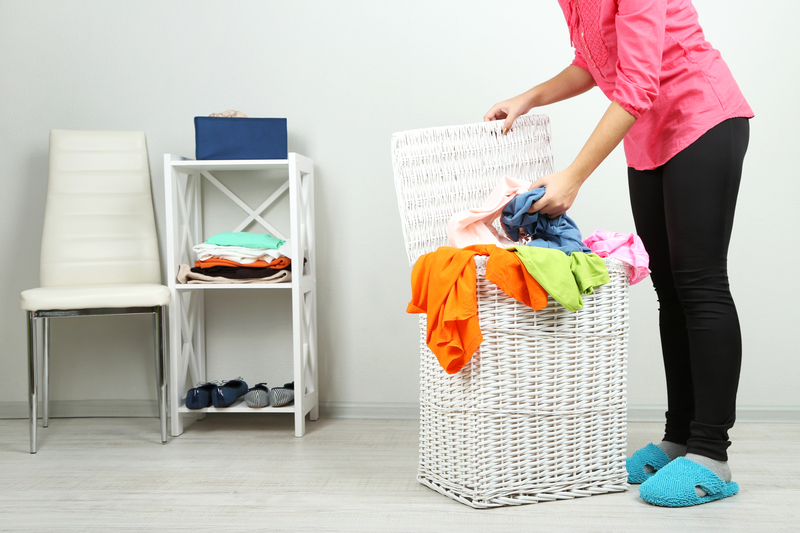Discover Top Jewellery Cleaning Techniques
Posted on 31/05/2025
Discover Top Jewellery Cleaning Techniques
Whether it's an elegant engagement ring, a beloved family heirloom, or a cherished necklace, jewellery often holds sentimental and material value. Over time, even the most precious ornaments can lose their shine due to dirt, oils, lotions, and exposure to pollutants. Learning effective jewellery cleaning techniques ensures your treasures remain as radiant as the day you got them. In this article, you'll discover the best ways to clean jewellery, safety precautions, professional tips, and how to keep your pieces sparkling for years.

Why Jewellery Loses Its Shine
Understanding why jewellery dulls is the first step to maintaining its brilliance. Several factors contribute to tarnishing and dirt build-up:
- Natural Oils: Your skin produces oils that can stick to jewellery surfaces.
- Cosmetics & Lotions: Products like perfumes, lotions, and hairsprays can cloud gems and metals.
- Environmental Exposure: Pollution, moisture, and sweat play a role in oxidation and tarnishing.
- Contact with Household Chemicals: Cleaning agents, bleach, and even some soaps can damage finishes.
With an understanding of these causes, let's explore top ways to clean jewellery safely and effectively.
Essential Jewellery Cleaning Tools
Before diving into various jewellery cleaning methods, gather these must-have supplies:
- Soft-bristled toothbrush or dedicated jewellery brush
- Lint-free or microfiber polishing cloths
- Mild dish soap (non-abrasive)
- Small bowls (preferably glass or ceramic)
- Baking soda (for tougher tarnish, on some metals)
- Ammonia (use cautiously - not for all gems or metals)
- Professional cleaning solutions (optional)
Having the right tools protects your jewellery from unintentional scratches and ensures you can perform professional jewellery cleaning at home.
Best At-Home Jewellery Cleaning Techniques
1. Gentle Soap and Water Cleaning
This is the most recommended method for cleaning gold, platinum, and diamond jewellery.
- Mix a few drops of mild dish soap with warm (not hot) water.
- Soak your jewellery piece for 15-20 minutes.
- Use a soft brush to gently clean hard-to-reach crevices.
- Rinse with clean, lukewarm water.
- Pat dry with a lint-free cloth.
This method works for most precious metals and hard gemstones (diamonds, sapphires, rubies), but avoid soaking softer gems like pearls and opals.
2. Baking Soda Paste for Tarnished Silver
Silver jewellery often tarnishes due to oxidation. One of the top silver jewellery cleaning techniques is a baking soda paste.
- Mix 2 parts baking soda with 1 part water to form a paste.
- Gently rub the paste onto your silver pieces using your fingers or a soft cloth.
- Let sit for 2-3 minutes for tough tarnish.
- Rinse thoroughly with clean water.
- Dry and polish with a soft cloth.
Important: Avoid using this method on pieces with soft stones, intricate settings, or antique jewellery, as it may scratch the surface.
3. Professional Jewellery Cleaning Solutions
There are dedicated jewellery cleaning solutions available in the market. These solutions are specially formulated to clean gold, platinum, and gemstone jewellery safely.
- Follow manufacturer instructions closely.
- Never use silver dip for gemstones, as it may cause discoloration or damage.
- Rinse all pieces thoroughly after cleaning.
Tip: Always test a small area first and ensure the solution matches your jewellery type.
4. Ultrasonic Jewellery Cleaners
An ultrasonic cleaner uses high-frequency sound waves to dislodge dirt and grime. It is one of the most effective professional jewellery cleaning techniques.
- Suitable For: Gold, platinum, hard gemstones (diamonds, sapphires, rubies).
- Not Suitable For: Soft stones (emeralds, opals, pearls), antique pieces, or any jewellery with glued-in settings.
- Fill the device as instructed and follow timing recommendations strictly.
- Rinse thoroughly and dry after cleaning.
Note: Consult your jeweller if you're unsure whether your piece is safe for ultrasonic cleaning.
5. Ammonia Solution for Diamonds
For a deep diamond ring cleaning, an ammonia solution can cut through stubborn grime:
- Mix six parts water with one part clear ammonia in a bowl.
- Soak the diamond jewellery for up to one minute (do not exceed to prevent damage).
- Brush gently and rinse under cold water.
- Dry thoroughly.
Warning: Never use ammonia on pearls, soft gemstones, silver, or antique jewellery.
6. Soap and Olive Oil for Pearls
Pearls are delicate and require special care. One of the safest pearl cleaning techniques is:
- Mix a small amount of mild soap in lukewarm water and add a drop of olive oil.
- Dampen a very soft cloth in the solution and gently wipe each pearl.
- Never soak pearl jewellery, as moisture can weaken the string.
- Allow to air dry flat before storing.
Special Care for Gemstone Jewellery
Cleaning Soft and Porous Stones
Stones like opals, turquoise, lapis lazuli, and coral can be easily damaged by chemicals, heat, or even water exposure. Best practices for gemstone cleaning include:
- Use only a soft, damp cloth to wipe the gemstone gently.
- Avoid ultrasonic cleaners and harsh chemicals.
- Do not submerge these stones for prolonged periods.
How to Clean Costume Jewellery
Costume jewellery, made from non-precious materials, often uses glue to secure stones. Excessive soaking or aggressive cleaning may dissolve the adhesive.
- Wipe with a lightly dampened cloth and immediately dry.
- If tarnished, use a gentle jewellery wipe designed for costume pieces.
- Never use abrasive materials or chemicals.
Professional Jewellery Polishing Techniques
Sometimes, home cleaning isn't enough, especially for pieces with extensive tarnish, intricate filigree, or loose stones. Professional polishing uses:
- High-speed polishing wheels
- Specialized polishing compounds
- Ultrasonic and steam cleaners
- Microscopes to inspect stone settings and identify repairs
It's wise to seek a jeweller's help for heirlooms, engagement rings, or valuable antiques.
How Often Should You Clean Your Jewellery?
Regular cleaning preserves the life and look of your ornaments. Here are recommended cleaning intervals for various pieces:
- Daily Wear Rings & Earrings: Weekly wipedown, moderate cleaning monthly.
- Occasional Wear Jewellery: Clean before and after wearing, polish every 6-12 months.
- Pearls: Wipe after each wear, professional stringing and deep cleaning every few years.
- Antique Pieces: Stick to light dusting and professional cleaning as needed.
Best Practices to Keep Jewellery Shining
- Store items separately in a lined jewellery box to avoid scratches.
- Remove jewellery before showering, swimming, or exercising to prevent buildup of soap and sweat.
- Put on jewellery after applying makeup, lotions, or perfume.
- Inspect pieces periodically for loose stones or worn clasps.
What to Avoid When Cleaning Jewellery
- Harsh Chemicals: Stay away from chlorine, bleach, acetone, or commercial abrasive cleaners.
- Toothpaste: Although often recommended, it can scratch metals and stones.
- Paper Towels: These can leave micro-scratches; opt for a soft cloth.
- Prolonged Soaking: This can damage delicate or glued-in settings.

Frequently Asked Questions
Can I clean my gold and diamond jewellery together?
Yes, both gold and diamond pieces can be cleaned with mild soap and warm water using a soft brush. Avoid mixing with pearls, emeralds, or costume jewellery.
What should I do if my jewellery is still dull after cleaning?
Seek professional cleaning. Persistent dullness can be due to worn metal, scratched surface, or internal residue requiring professional attention.
Are ultrasonic jewellery cleaners safe for all pieces?
No. While they are among the top jewellery cleaning methods, soft gemstones (opals, emeralds, pearls), glued settings, and antique items may be damaged. Always check with a professional.
How can I prevent silver jewellery from tarnishing?
- Store pieces in anti-tarnish pouches or soft cloth.
- Keep away from humid environments.
- Clean and polish regularly.
Conclusion: Shine Bright with Smart Jewellery Cleaning
With the top jewellery cleaning techniques covered in this article, you can restore brilliance and preserve heirlooms with confidence. Remember, every gemstone and metal is unique, and gentle methods are always preferred. For sentimental or high-value pieces, consult a professional to avoid costly mistakes. Regular maintenance, combined with the right home-care practices, will keep your jewellery looking its dazzling best for generations to come.
Unlock the secret to everlasting shine--care for your jewellery, and it will remain a radiant reflection of your memories and milestones.
Latest Posts
Banish Pet Odor from Your Living Space
Master the Art of Car Cleaning: Professional Techniques
Mastering Curtain Cleanliness: Expert Tips for Pristine Drapes
Mastering the Art of Washing Velvet Curtains with Care
Revitalize your space: Dive into our comprehensive Deep Clean Checklist for spring





